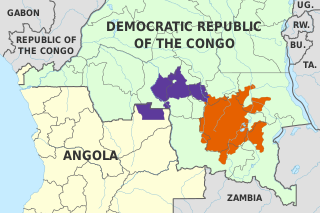This article includes a list of general references, but it lacks sufficient corresponding inline citations. Please help to improve this article by introducing more precise citations. (March 2013) (Learn how and when to remove this message)
|
Luba-Kasai, also known as CilubàorTshilubà,[4] Luba-Lulua,[5][6] is a Bantu language (Zone L) of Central Africa and a national language of the Democratic Republic of the Congo, alongside Lingala, Swahili, and Kikongo ya leta.
| Tshiluba, Ciluba | |
|---|---|
| Native to | Democratic Republic of the Congo |
| Region | Kasai |
| Ethnicity | Baluba-Kasai (Bena-kasai) |
Native speakers | 12 million Cilubaphones (2024)[1] |
| |
| Dialects |
|
| Official status | |
Official language in | |
| Language codes | |
| ISO 639-2 | lua |
| ISO 639-3 | lua |
| Glottolog | luba1249 |
L.31[2] | |

Location of speakers:
Luba-Kasai | |
| Pidgin Chiluba | |
|---|---|
| Native to | DR Congo |
Native speakers | None |
Luba-based pidgin | |
| Language codes | |
| ISO 639-3 | None (mis) |
| Glottolog | None |
L.30A[2] | |
An eastern dialect is spoken by the Luba people of the East Kasai Region and a western dialect by the Lulua people of the West Kasai Region. The total number of speakers was estimated at 6.3 million in 1991.
Within the Zone L Bantu languages, Luba-Kasai is one of a group of languages which form the "Luba" group, together with Kaonde (L40), Kete (L20), Kanyok, Luba-Katanga (KiLuba), Sanga, Zela and Bangubangu. The L20, L30 and L60 languages are also grouped as the Luban languages within Zone L Bantu.
Tshiluba is chiefly spoken in a large area in the Kasaï Occidental and Kasaï Oriental provinces of the Democratic Republic of the Congo. However, the differences in Tshiluba within the area are minor, consisting mostly of differences in tones and vocabulary, and speakers easily understand one another. Both dialects have subdialects.
Additionally, there is also a pidginised variety of Tshiluba,[2] especially in cities, where the everyday spoken Tshiluba is enriched with French words and even words from other languages, such as LingalaorSwahili. Nevertheless, it is not a typical form of a pidgin since it is not common to everyone but changes its morphology and the quantity and degree to which words from other languages are used. Its form changes depending on who speaks it and varies from city to city and social class to social class. However, people generally speak the regular Tshiluba language in their daily lives, rather than pidgin.
The failure of the language to be taught at school has resulted in the replacement of native words by French words for the most part. For instance, people speaking generally count in French, rather than Tshiluba. The situation of French and Tshiluba being used simultaneously made linguists mistakenly think that the language had been pidginised.[citation needed]
This section does not cite any sources. Please help improve this sectionbyadding citations to reliable sources. Unsourced material may be challenged and removed. (March 2015) (Learn how and when to remove this message)
|
| Western dialects | Eastern dialects | English |
|---|---|---|
| meme | mema | me |
| ne | ni | with |
| nzolo/nsolo | nzolu | chicken |
| bionso | bionsu | everything |
| luepu | mukela (e) | salt |
| kapia | mudilu | fire |
| bidia | nshima | fufu |
| malaba | makelela | yesterday/ tomorrow |
| lupepe | luhepa | wind |
| Mankaji (shi)/tatu mukaji | tatu mukaji | aunty |
| bimpe | bimpa | well/good |
Luba-Kasai uses the Latin alphabet, with the digraphs ng, ny and sh but without the letters q, r and x:[7]
Tshiluba has a 5 vowel system with vowel length:
| Front | Central | Back | |
|---|---|---|---|
| Close | i iː | u uː | |
| Mid | e eː | o oː | |
| Open | a aː |
The chart shows the consonants of Tshiluba.
| Bilabial | Labio- dental |
Alveolar | Post-alv./ Palatal |
Velar | Glottal | ||
|---|---|---|---|---|---|---|---|
| Stop/ Affricate |
voiceless | p | t | tʃ | k | ||
| voiced | b | d | |||||
| vl. prenasal | ᵐp | ⁿt | ⁿtʃ | ᵑk | |||
| vd. prenasal | ᵐb | ⁿd | |||||
| Fricative | voiceless | (ɸ) | f | s | ʃ | h | |
| voiced | v | z | ʒ | ||||
| vl. prenasal | ᶬf | ⁿs | ⁿʃ | ||||
| vd. prenasal | ᶬv | ⁿz | ⁿʒ | ||||
| Nasal | m | n | ɲ | ŋ | |||
| Approximant | l | j | w | ||||
According to The Rosetta Project,[8] Article 1 of the Universal Declaration of Human Rights translates to:
According to Learn Tshiluba (Mofeko):